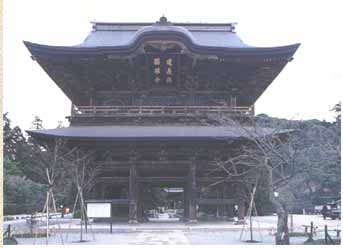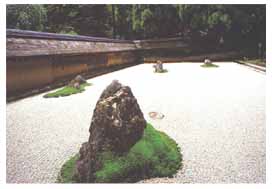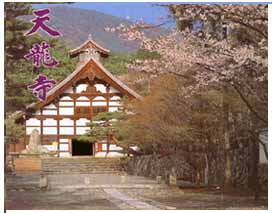|
 Of these traditions, two, those of the Rinzai school and the Soto school, reached Japan, in the 12th century and at the beginning of the 13th century, respectively. Both schools are still active there today. While Ch'an in China declined after the Sung period, in Japan, as Zen, it began to flourish anew. Dogen Zenji, who brought the Soto tradition to Japan, and Eisai Zenji, Shinchi Kakushin, Shomyo, and others in the Rinzai tradition, together with a few Chinese Ch'an masters who were invited to Japan, founded the Zen tradition. A school founded in Japan in the middle of the 17th century by the Chinese master, Yin-yuan Lung-ch'i (Jap., Ingen Ryuki), the Obaku school, is today practically without importance, having only one active monastery, the Mampuku-ji in Uji near Kyoto. One of the most outstanding figures in Zen was Hakuin Zenji, who reformed Japanese Rinzai Zen in the 18th century after a period of deterioration and helped it to revive and flourish once again. Of these traditions, two, those of the Rinzai school and the Soto school, reached Japan, in the 12th century and at the beginning of the 13th century, respectively. Both schools are still active there today. While Ch'an in China declined after the Sung period, in Japan, as Zen, it began to flourish anew. Dogen Zenji, who brought the Soto tradition to Japan, and Eisai Zenji, Shinchi Kakushin, Shomyo, and others in the Rinzai tradition, together with a few Chinese Ch'an masters who were invited to Japan, founded the Zen tradition. A school founded in Japan in the middle of the 17th century by the Chinese master, Yin-yuan Lung-ch'i (Jap., Ingen Ryuki), the Obaku school, is today practically without importance, having only one active monastery, the Mampuku-ji in Uji near Kyoto. One of the most outstanding figures in Zen was Hakuin Zenji, who reformed Japanese Rinzai Zen in the 18th century after a period of deterioration and helped it to revive and flourish once again.
 Esoterically regarded, Zen is not a religion but rather an indefinable, incommunicable (fukasetsu) root, free from all names, descriptions, and concepts, that can only be experienced by each individual for him- or herself. From expressed forms of this, all religions have sprung. In this sense Zen is not bound to any religion, including Buddhism. It is the primordial perfection of everything existing, designated by the most various names, experienced by all great sages, saints, and founders of religions of all cultures and times. Buddhism has referred to it as the "identity of samsara and nirvana." From this point of view zazen is not a "method" that brings people living in ignorance (avidya) to the "goal" of liberation; rather it is the immediate expression and actualization of the perfection present in every person at every moment.
Esoterically regarded, Zen is not a religion but rather an indefinable, incommunicable (fukasetsu) root, free from all names, descriptions, and concepts, that can only be experienced by each individual for him- or herself. From expressed forms of this, all religions have sprung. In this sense Zen is not bound to any religion, including Buddhism. It is the primordial perfection of everything existing, designated by the most various names, experienced by all great sages, saints, and founders of religions of all cultures and times. Buddhism has referred to it as the "identity of samsara and nirvana." From this point of view zazen is not a "method" that brings people living in ignorance (avidya) to the "goal" of liberation; rather it is the immediate expression and actualization of the perfection present in every person at every moment.
(excerpted from "The Encyclopedia of
Eastern Philosophy and Religion", Shambhala, Boston)
|

 Bodhidharma brought Dhyana Buddhism from India to China at the beginning of the 6th century. He became the first patriarch of the lineage of Ch'an school. The Ch'an school split into Northern school and Southern school after the 5th patriarch. The lineage of the Southern school Ch'an (headed by Hui-neng, 638-713) further split into "five houses, seven schools" (goke-shichishu) after Chinese Tang dynasty; these were currents within the Ch'an tradition that differed in details of training style but not in essential content. They are the Soto school, the Ummon school, the Hogen school, the Igyo school, and the Rinzai school; sub schools of Rinzai are the Yogi school and the Oryo school.
Bodhidharma brought Dhyana Buddhism from India to China at the beginning of the 6th century. He became the first patriarch of the lineage of Ch'an school. The Ch'an school split into Northern school and Southern school after the 5th patriarch. The lineage of the Southern school Ch'an (headed by Hui-neng, 638-713) further split into "five houses, seven schools" (goke-shichishu) after Chinese Tang dynasty; these were currents within the Ch'an tradition that differed in details of training style but not in essential content. They are the Soto school, the Ummon school, the Hogen school, the Igyo school, and the Rinzai school; sub schools of Rinzai are the Yogi school and the Oryo school.  Of these traditions, two, those of the Rinzai school and the Soto school, reached Japan, in the 12th century and at the beginning of the 13th century, respectively. Both schools are still active there today. While Ch'an in China declined after the Sung period, in Japan, as Zen, it began to flourish anew. Dogen Zenji, who brought the Soto tradition to Japan, and Eisai Zenji, Shinchi Kakushin, Shomyo, and others in the Rinzai tradition, together with a few Chinese Ch'an masters who were invited to Japan, founded the Zen tradition. A school founded in Japan in the middle of the 17th century by the Chinese master, Yin-yuan Lung-ch'i (Jap., Ingen Ryuki), the Obaku school, is today practically without importance, having only one active monastery, the Mampuku-ji in Uji near Kyoto. One of the most outstanding figures in Zen was Hakuin Zenji, who reformed Japanese Rinzai Zen in the 18th century after a period of deterioration and helped it to revive and flourish once again.
Of these traditions, two, those of the Rinzai school and the Soto school, reached Japan, in the 12th century and at the beginning of the 13th century, respectively. Both schools are still active there today. While Ch'an in China declined after the Sung period, in Japan, as Zen, it began to flourish anew. Dogen Zenji, who brought the Soto tradition to Japan, and Eisai Zenji, Shinchi Kakushin, Shomyo, and others in the Rinzai tradition, together with a few Chinese Ch'an masters who were invited to Japan, founded the Zen tradition. A school founded in Japan in the middle of the 17th century by the Chinese master, Yin-yuan Lung-ch'i (Jap., Ingen Ryuki), the Obaku school, is today practically without importance, having only one active monastery, the Mampuku-ji in Uji near Kyoto. One of the most outstanding figures in Zen was Hakuin Zenji, who reformed Japanese Rinzai Zen in the 18th century after a period of deterioration and helped it to revive and flourish once again.  Esoterically regarded, Zen is not a religion but rather an indefinable, incommunicable (fukasetsu) root, free from all names, descriptions, and concepts, that can only be experienced by each individual for him- or herself. From expressed forms of this, all religions have sprung. In this sense Zen is not bound to any religion, including Buddhism. It is the primordial perfection of everything existing, designated by the most various names, experienced by all great sages, saints, and founders of religions of all cultures and times. Buddhism has referred to it as the "identity of samsara and nirvana." From this point of view zazen is not a "method" that brings people living in ignorance (avidya) to the "goal" of liberation; rather it is the immediate expression and actualization of the perfection present in every person at every moment.
Esoterically regarded, Zen is not a religion but rather an indefinable, incommunicable (fukasetsu) root, free from all names, descriptions, and concepts, that can only be experienced by each individual for him- or herself. From expressed forms of this, all religions have sprung. In this sense Zen is not bound to any religion, including Buddhism. It is the primordial perfection of everything existing, designated by the most various names, experienced by all great sages, saints, and founders of religions of all cultures and times. Buddhism has referred to it as the "identity of samsara and nirvana." From this point of view zazen is not a "method" that brings people living in ignorance (avidya) to the "goal" of liberation; rather it is the immediate expression and actualization of the perfection present in every person at every moment.